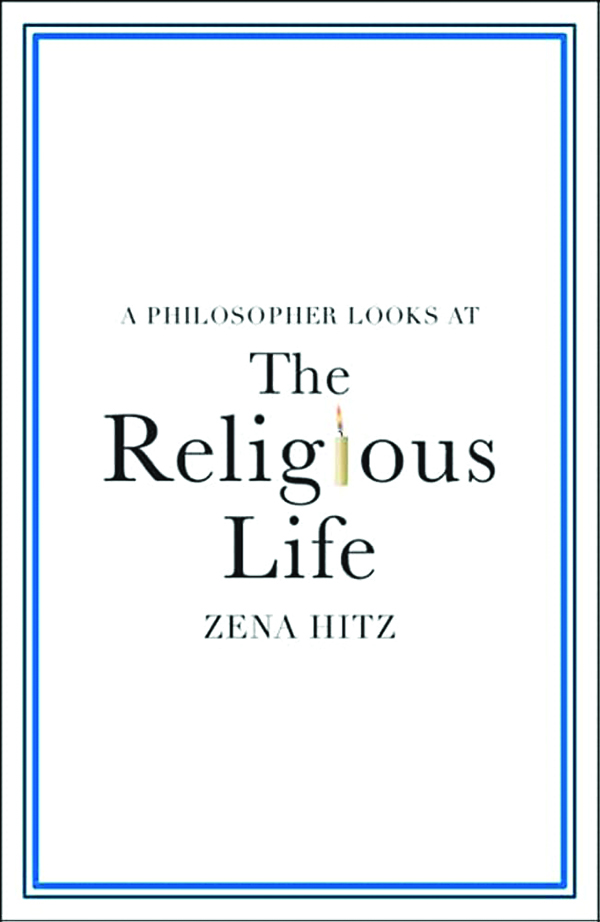
Lost in religion
Varad Mehta
Imagine if one day someone you know, a relative, say, like a sibling or cousin, or a close friend or a co-worker or maybe even just an acquaintance or high school classmate, told you they were chucking it all away and entering a convent or monastery. Goodbye, worldly possessions, goodbye, job, goodbye, life; hello, vows of obedience, of poverty, even (shudder) of chastity. How would you react? With surprise, maybe, or dismay. More likely, shock. You might even think they were mad.

About a decade ago, Zena Hitz, a Cambridge- and Princeton-trained philosopher (who now teaches at St. John’s College in Annapolis), found herself in exactly that position. Except she wasn’t the one discovering someone she knew was giving it all up to pursue a religious vocation — she was the one doing it. The sense of astonishment and wonder she still feels at making that choice, a modern, highly educated professional woman in the 21st century, just like thousands of people for thousands of years before her made it, animates Hitz’s succinct, deceptively broad, and deeply personal book-length essay about religious vocations and those who answer their call, A Philosopher Looks at the Religious Life.
Most people find the decision to answer the call stupefying because they share the “more obvious view of religious life” that it’s “a waste of one’s time and talent.” Hitz therefore articulates the less obvious view, “that religious life is especially useful.” It is so because it is a life stripped of empty pursuits and dedicated instead to the love of “God as transcendent and eternal.”
Seeking that love is what drives someone “to renounce everything to follow Christ” and “to live for God alone.” It is a love that “is sparked by an insight that leads” to the rejection of the typical objects of desire, such as wealth, fame, power, even one’s spouse, parents, and children. The insight animating this greater love is the realization of human mortality and the stark, appalling truth that “everything dies, is destroyed.” We cannot hold on to anything. “Everything comes to an end, while our hearts long for eternity.”
Is there, then, “anything that can satisfy our desire for a joy outside of time?” To heed the religious call is to affirm that there is: God. “The only thing that you have a hope of not losing is God.” But the only way to find God, avers Hitz, is to lose oneself, at least the self that exists to the world.
The primary virtue upon which the religious life stands is “wholeheartedness,” which Hitz colorfully analogizes to “putting all our eggs in one basket and waiting for them to break,” as they sooner or later shall. Wholeheartedness is the opposite of “lukewarmness,” which is characteristic of the inconstant, shifting lives most of us lead. Lukewarmness is incompatible with and even antithetical to the religious life. It requires singular, unstinting devotion — that is, obedience. “To vow obedience is to dedicate oneself to one thing with one’s whole heart.” That isn’t something that comes naturally; human nature, indeed, rebels against it. Body and soul must be trained to it. The practices of religious life are aimed at providing that training.
That abnegation enables “living in truth and the encounter with a loving God.” These “two fundamental elements of Christian spiritual life,” as Hitz calls them, manifest in the ascetic practices whose purpose she spends much of the book explaining, including poverty, solitude, silence, communal living, and celibacy.
Asceticism is necessary because it corrects the self-absorption that is our natural state. It “is the careful cultivation of the objects of our attention.” Solitude, for example, functions “both as a school of wholeheartedness and as a space of union or communion with God.” Once such intimacy with God has been achieved, Hitz asserts, “all things and experiences can be taken in as goods from the omnipotent ruler of everything.”
Communal living has a similar role to solitude in that it fosters intimacy with the divine by “making war on our natural attachments” to particular people and drawing us toward “the loving unity of all humanity.” Celibacy is justified on much the same grounds. Erotic or romantic love is “the great rival” to the religious life, what, “above all, repulses” us from it.
Readers of Hitz’s previous book about the value of intellectual pursuits, Lost in Thought, will detect multiple parallels and affinities between her account of the religious life and her earlier depiction of the intellectual life. The latter also requires withdrawing from the social world. Only that way “can the fundamentals of human and divine life become clear.” Nor can the intellectual life thrive without asceticism. It is a kind of “discipline” and “self-denial” born of “a turning away from things within ourselves.” And as with the religious life, the intellectual life is a quest for something greater than ourselves: “To exercise the love of learning is to flee what is worst in us for the sake of the better, to reach for more in the face of what is not enough.” Both the intellectual life and the religious life as Hitz conceives them lure the self toward itself and away from the outside world. Yet one may argue with equal validity, I think, that they pull the soul outward, away from itself to something greater, something beyond, be it God or a vastly expanded sense of our humanity. Only then is true fulfillment in either possible.
Nonconfessing readers may object to Hitz’s conclusion that unless we embrace “Christian freedom as an ideal mode of life,” we lack a conception of human flourishing and the human good “truly available to everyone.” And even the devout may recoil from her emphasis on “the basic catastrophe of human existence,” her insistence that “pain and darkness” are man’s “ultimate reality.” What believer and nonbeliever alike can agree on is something Hitz subtly reminds us of on nearly every page: the fundamental radicalism of Christianity. The idea of Christian love as a commitment “to do good to each and every human being one encounters” is a radical notion. So is the injunction to love one’s enemy. As is nearly every aspect of religious life Hitz discusses. We no longer see this because Christianity furnishes so many of the threads out of which the fabric of modern civilization is woven that we no longer recognize their distinctly Christian character.
America, like the West as a whole, is becoming increasingly secularized. Religious observance and adherence are declining, vocations precipitously so. Most people are unlikely to hear the religious call, let alone answer it. Yet quieter though it may have become, the call still sounds — as Hitz’s own example testifies. Her perceptive, humane study is an ideal guide for anyone who suddenly finds someone they know hearing the call, or, even more, hears it themselves.
Hitz doesn’t expect that reading her book will turn someone into the next St. Francis. That’s not the point. Her purpose isn’t to encourage anyone to follow the religious life. It is more subtle than that. It is to help us, at a time when modern society more than ever regards the religious life as the relic of a bygone age, understand those who not only still hear the call but heed it.
Varad Mehta is a writer and historian. He lives in the Philadelphia area. Find him on Twitter @varadmehta.
